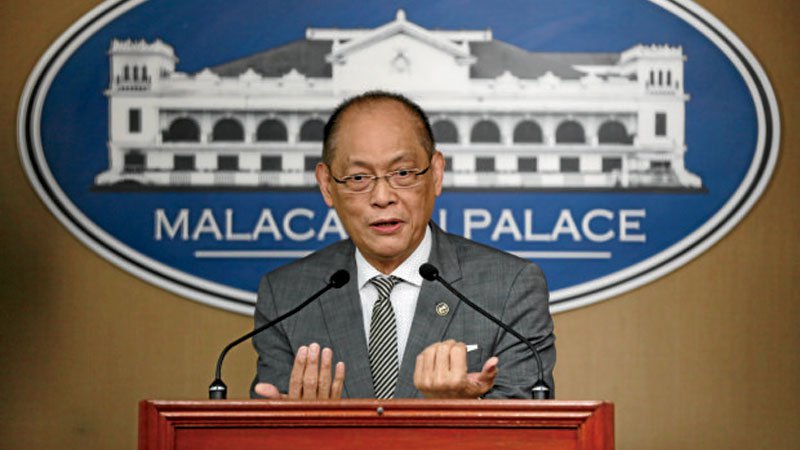Gov’t eyeing prepayments, additional capital for GSIS to fund ballooning military pension

Budget Secretary Benjamin E. Diokno. INQUIRER file photo
The government may have to infuse more capital into the state-run pension fund Government Service Insurance System (GSIS) once it includes uniformed personnel in its coverage, Budget Secretary Benjamin Diokno said.
“I think you cannot avoid infusing government funds to make it attractive for the GSIS to absorb uniformed personnel into its system,” Diokno told a press conference Wednesday.
Diokno said that while they have yet to determine how much additional capitalization should be infused into the GSIS, there must be a distinction between the funds for civilian employees and those for uniformed personnel.
Another way that Diokno deemed can temper the ballooning pension of military and police officers is by prepaying the benefit disbursements before they retire.
At present, pension benefits of uniformed personnel increase alongside the salary hikes being enjoyed by those in active service.
The GSIS’s newly appointed president and general manager Jesus Clint Aranas earlier told the Inquirer that they were open to managing a new pension scheme for newly installed uniformed personnel but cannot absorb existing retirees as the indexation of benefits that they currently enjoy will be unsustainable for the pension fund.
“We’re very welcome to that. It’s just that, if ever we’re going to take over the fund of the pensioners of the uniformed personnel, we would like to enrol the newly hired and commissioned officers, not the existing, because we cannot afford it,” Aranas said in an interview last month.
Aranas noted that at present, uniformed personnel enjoy indexation of benefits, which means that even when they retire, they also still get a similar increase in benefits when active members receive a pay hike.
“The GSIS fund cannot support that. It is not sustainable for us. First, they have not contributed to us, so it will be very hard for them to come in the middle of the game wherein there were no contributions made to us and then we’ll be subjected to a contract where even our existing members and pensioners are affected,” he said.
As for a new pension system for incoming uniformed personnel, Aranas said that despite the “high risks,” the GSIS was open to managing a separate fund for them.
“The terms may be different because they are ‘high risk’. They have a high risk premium—they retire at 55 and they are very fit. They will enjoy their pension for a long time but will contribute for a short period because they retire early, and they don’t die young,” he noted.
“It’s not that we want them to die young, but what I’m saying is that the fund [for uniformed personnel] may not be sustainable and if ever we’re going to do that, we’re going to separate the fund from the other funds we are holding; otherwise, the other funds will be affected,” he added.
Aranas said a “bespoke” pension system is in the works for uniformed personnel.
“We cannot deviate so much on the benefits, because it be unfair to the existing members and pensioners. But, maybe, in our contract with them, the policy, the premium and the contribution rate will be bespoke because, remember, uniformed personnel are always exposed to risks because of the nature of their job,” Aranas said.
Asked if the benefits under a pension scheme for uniformed personnel managed by the GSIS will be less attractive compared to the benefits being enjoyed by pensioners at present, Aranas replied: “It’s not about what is attractive or not; the question is: Is it sustainable? Can we actually afford the good intentions? Of course, we want to give good packages; it’s just that, is it sustainable, and can we afford it? Otherwise, we will be putting the general fund at risk. I don’t want to do that.”
The Duterte administration was worried about the ballooning pension of uniformed personnel, such that the interagency Development Budget Coordination Committee is pushing for a seed fund worth trillions of pesos that will generate income for retired military officers.
Finance Secretary Carlos G. Dominguez III earlier said the government plans joint ventures with the private sector in developing massive military land to secure additional funding for uniformed personnel’s ballooning pension.
Diokno had also said they needed to pass a law that will likewise allow part of the proceeds from disposition of properties to fund military pension.
Last year, President Duterte urged the military to lease out its remaining lands in Fort Bonifacio to raise more funds for its modernization program.
The President said leasing out military land in Fort Bonifacio—the location of the headquarters of the Philippine Army and the Philippine Marines, as well as Bonifacio Naval Station—would raise “trillions” of pesos for the Armed Forces of the Philippines.
The government privatized 240 hectares of military land in Fort Bonifacio in the early 1990s to support the AFP modernization program. /jpv
